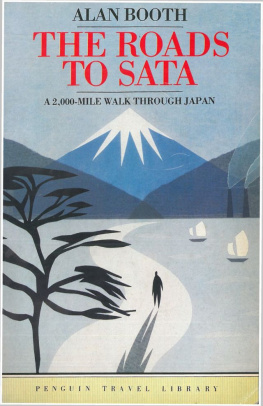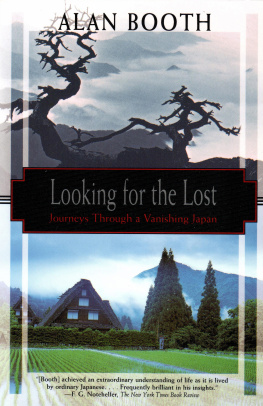Alan Booth - The Roads To Sata
Here you can read online Alan Booth - The Roads To Sata full text of the book (entire story) in english for free. Download pdf and epub, get meaning, cover and reviews about this ebook. publisher: Penguin Books, genre: Detective and thriller. Description of the work, (preface) as well as reviews are available. Best literature library LitArk.com created for fans of good reading and offers a wide selection of genres:
Romance novel
Science fiction
Adventure
Detective
Science
History
Home and family
Prose
Art
Politics
Computer
Non-fiction
Religion
Business
Children
Humor
Choose a favorite category and find really read worthwhile books. Enjoy immersion in the world of imagination, feel the emotions of the characters or learn something new for yourself, make an fascinating discovery.
- Book:The Roads To Sata
- Author:
- Publisher:Penguin Books
- Genre:
- Rating:4 / 5
- Favourites:Add to favourites
- Your mark:
- 80
- 1
- 2
- 3
- 4
- 5
The Roads To Sata: summary, description and annotation
We offer to read an annotation, description, summary or preface (depends on what the author of the book "The Roads To Sata" wrote himself). If you haven't found the necessary information about the book — write in the comments, we will try to find it.
Alan Booth: author's other books
Who wrote The Roads To Sata? Find out the surname, the name of the author of the book and a list of all author's works by series.
The Roads To Sata — read online for free the complete book (whole text) full work
Below is the text of the book, divided by pages. System saving the place of the last page read, allows you to conveniently read the book "The Roads To Sata" online for free, without having to search again every time where you left off. Put a bookmark, and you can go to the page where you finished reading at any time.
Font size:
Interval:
Bookmark:

P E N G U I N T R A V E L L I B R A R Y
The Roads to Sata
Alan Booth was born in 1946 in Leytonstone, London. He studied drama at Birmingham University. In 1970 he went to Japan to study Noh theatre and has remained there ever since. He has written extensively about Japan, including a book on Japanese folk festivals, Devils, Gods and Cameramen, and is also film critic for a Japanese newspaper. He lives in Tokyo with his wife and baby daughter.

A 2000-Mile Walk through Japan
Alan Booth
PENGUIN BOOKS
I am lucky in having among my friends a discerning publisher and a perspicacious editor. Though neither was professionally involved with this book, they both read or listened to all of it and were disturbingly frank in their criticism and equally purposeful in their encouragement. So my thanks to Ong Sok-Chzeng, for her incredulity and laughter, and to Timothy Harris, who knows a cricket from a grasshopper and was especially energetic in the removal of an anapaest.
Penguin Books Ltd, Harmondsworth, Middlesex, England
Viking Penguin Inc., 40 West 23rd Street, New York, New York 10010, U.S.A.
Penguin Books Australia Ltd, Ringwood, Victoria, Australia
Penguin Books Canada Ltd, 2801 John Street, Markham, Ontario, Canada L3R IB4
Penguin Books (N.Z.) Ltd, 182-190 Wairau Road, Auckland 10, New Zealand
First published in Japan by John Weatherhill, Inc. 1985
First published in Great Britain by Viking 1986
Published in Penguin Books 1987
Copyright Alan Booth, 1985
All rights reserved
Reproduced, printed and bound in Great Britain by Hazell Watson & Viney Limited, Member of the BPCC Group, Aylesbury, Bucks
Typeset in Bembo
Except in the United States of America, this book is sold subject to the condition that it shall not, by way of trade or otherwise, be lent, re-sold, hired out, or otherwise circulated without the publisher's prior consent in any form of binding or cover other than that in which it is published and without a similar condition including this condition being imposed on the subsequent purchaser
...the sundry contemplation of my travels, which, by often rumination wraps me in a most humorous sadness.
Jaques
in As You Like It
Author's NoteFew people (warns the publisher, grumbling) are likely to know where Sata is, so I had better locate it in this note. Sata is the name of the southernmost cape of the southernmost of the four main islands of Japan. I walked there from Soya, the northernmost cape of the northernmost island, and the roads between, and the things I saw and heard and did along them, are the subjects of this book.
Japan is a long country. If I had walked the same distance across the same latitudes in North America, the trek would have taken me from Ottawa to Mobile, Alabama; and if I had started in Europe, I would have marched from Belgrade through the Middle East to the Gulf of Aquaba. The distances I walked are given here in kilometers, not miles, because it is in kilometers that most Japanese think, and that I thought every morning, noon, and evening of my journey.
If I could, I would individually thank the men, women, and children who populate these pages, but I never knew the names of most of them, and I have thought it in their interests to alter those names I did know. Where names are used, they are used in the Japanese manner: family name first, given name last.
I have tried to avoid generalizations, particularly "the Japanese." "The Japanese" are 120,000,000 people, ranging in age from 0 to 119, in geographical location across 21 degrees of latitude and 23 of longitude, and in profession from emperor to urban guerrilla. This book is about my encounters with some twelve hundred businessmen, farmers, grandmothers, fishermen, housewives, shopkeepers, schoolchildren, soldiers, policemen, monks, priests, tourists, journalists, professors, laborers, maids, waiters, carpenters, teachers, innkeepers, potters, dancers, cyclists, students, truck drivers, Koreans, Americans, bar hostesses, professional wrestlers, government officials, hermits, drunks, and tramps.
Outposts
One of the noodle shops at Cape Soya had a pair of loudspeakers perched high up above its door and out of these came, every five minutes, a song:
The ice floes melt, the spring wind blows,
the sweet brier blooms, the sea gull cries,
far out to sea the smoke of foreign ships
delights the eye at Soya Cape.
Snow storms abate, the chill is past,
the shellfish stir along the shore,
while men throw wide the doors of their hearts,
and the sea roars on at Soya Cape.
It was late in June so most of Japan was dripping and graythe rainy season was at its height. But Hokkaido, the northernmost of Japan's four main islands, was cracking under a heat wave. The sea did not roar or even mutter; it was intense and blinding, like in advertisements for citrus fruit. Only with great reluctance did the people of Cape Soya venture out into the scorching sunshine. Most of them slouched in the shade of their doorways watching the trickle of honeymoon couples vainly trying with the aid of the coin telescopes to pierce the forty-three kilometers of heat-haze that separated their noodle shops from the Soviet Union. Four young motorcyclists in gleaming black leather sat sweating and drumming on a table outside one of the restaurants, picking flies off the rims of their cola bottles,

All night the wind blew into my room in the minshuku at Cape Soya and I couldn't sleep. The wind sang as it blew through the stovepipes till I thought there was a nest of birds singing: crafty birds, Japanese birds, transforming the pipes into their own loudspeaker. In the morning the owner of the minshuku gave me a small cotton handkerchief with a map of Hokkaido on it. It would come in handy if I took a wrong turn, he explained. Carefully, he unfolded the handkerchief and stamped the address and telephone number of his minshuku in the top right-hand corner.
"What's the date?" he called out to his wife in the kitchen.
"The twenty-eighth," she called back.
With great concentration he inked a second rubber stamp and neatly stamped "June 28" under his address, stepping back to admire the effect. But it still didn't satisfy him, so below the date he wrote in small red characters "7:00 start."
As though on cue the next-door speakers squealed into life and for the third or fourth time I retied my bootlaces.
"It's the twenty-ninth," I remembered.
listening to the taped voice shriek about shellfish, and gazing across at the four brand new Hondas they had parked within a yard of the end of Japanlatitude 45 3 N, the latitude of Milan, the Crimea, and Portland, Oregonthe furthest north you can get in Japanese eyes and still count yourself civilized.
When the sun set the flies retired to the hills, the taped voice snapped off in a burst of static, and the northern evening grew a fraction cooler. Through the open door of the minshukuthe lodging housewhere I was staying, I could see the prawn boats on the flat pink sea, so far away and so still that they looked like matchwood.
"What time do you want to get up in the morning?" asked the owner of the minshuku. He was a tall man, brusque, unshaven, fiddling with his Dunhill lighter.
"I don't know. Seven, I suppose. I'd better get an early start."
Font size:
Interval:
Bookmark:
Similar books «The Roads To Sata»
Look at similar books to The Roads To Sata. We have selected literature similar in name and meaning in the hope of providing readers with more options to find new, interesting, not yet read works.
Discussion, reviews of the book The Roads To Sata and just readers' own opinions. Leave your comments, write what you think about the work, its meaning or the main characters. Specify what exactly you liked and what you didn't like, and why you think so.












